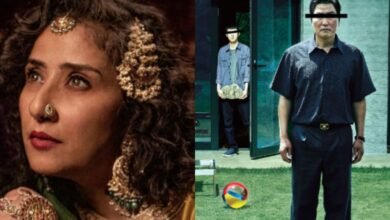Unpretentious And Steadfastly Simple Film Is Well Worth A Viewing

One brood, three generations, four women and the men in their complicated lives 0ccupy the core of Love, Sitara, a film peppered with the familiar tics of a dysfunctional family drama. Does that make it a trite affair? Not quite.
The Zee5 film directed by Vandana Kataria revolves around an about-to-wed couple who learn, well before they go through with the nuptials, that marriage is indeed anything but a bed of roses.
The peppy and playful Hindi-Malayalam film is punctuated by moments of high intensity that pit sister against sister, man against woman, individual against family.
The flow of the story is a touch uneven and the resolutions and closures that Love, Sitara thinks up tend to be somewhat facile, but the impulses of the men and women who people the plot aren’t always predictable.
The screenplay, written by the director and Sonia Bahl, centres on the impending wedding of a Mumbai-based Malayali interior designer played by Sobhita Dhulipala and Punjabi chef Arjun Anand (Rajeev Siddhartha) in the small-town Kerala home of the former’s grandmother (B. Jayashree).
The family reunion is the culmination of a choppy now-off, now-on relationship. It only gets worse. Over the span of a few days, everything that can go wrong does go wrong. Buried secrets come to the fore, simmering tensions rise, and angry outbursts put the wedding under a cloud.
The lid is blown off a clandestine love affair. And a marriage hits the skids. As skeletons tumble out of the closet, a long-suppressed truth drives a wedge between two sisters, one ‘happily’ married the other a confirmed spinster.
In the turmoil that ensues, the family members are forced to have a relook at the choices that they, and their near ones, made in the past and are in the process of contemplating in the present.
On the face of it, nobody in and around the family has any apparent worry in the world. Would-be bride Sitara (Sobhita Dhulipala) is a super-successful interior designer. Bridesmaid Anjali (Tamara D’Souza), the titular character’s best friend, is a busy photojournalist. And Sitara’s aunt, Hema (Sonali Kulkarni), is an airhostess she looks up to.
The North Indian man who is about to become a part of the family has plans in place for a self-owned restaurant in Singapore. Sitara’s dad Govind (Sanjay Bhutiani) heads a hotel chain. Thus, on the professional front, they are all in complete control. It is from the personal sphere that their problems stem.
In the film’s opening scene, Sitara is told she is pregnant. The news nonplusses her because her ovaries are believed to be damaged. Alarmed, she returns to Arjun (Rajeev Siddhartha), the man she broke up with a few months ago, and proposes to him.
It is now the guy’s turn to be caught by surprise. But he not only agrees to marry Sitara, he also acquiesces to go along with her and tie the knot the traditional way, surrounded by friends and family in Kerala.
After the couple lands in Kerala and they are joined by Anjali, who is unsure if it is a good idea for Sitara to take the plunge, some of the film’s focus shifts to Amumma (B. Jayashree), the wise, chatty and insouciant grandma who has a way of making light of the vagaries of the man-woman relationship.
The old lady has obviously seen much more life than anybody else. Truth bombs keep exploding around her. She does not lose her calm. Sitara’s mom, Latha (Virginia Rodrigues), Hema’s elder sister, does. Her response to a crisis becomes the film’s principal flashpoint.
Everybody in the family either nurses a damaging secret or is kept in the dark about an inconvenient truth. They lurch from one crisis to another in the bargain. Their obfuscations range from something as innocuous as smoking on the sly to matters of far greater gravity such as hiding a pregnancy or carrying on with an extra-marital affair long past its expiry date.
Granny, the two sisters and Sitara confront revelations and forgotten indiscretions that threaten to derail their relationships. The pursuit of happiness, they figure out, is invariably a path strewn with thorns, especially when lies are perpetuated to avoid facing the truth.
Discounting a minor squirt of pre-climactic mush, Love, Sitara is a refreshingly non-judgmental, fair-minded and nimble-toed take on the grief that men and women cause to themselves and to those around them as they try to either pull the wool over each other’s eyes or attempt to call one another’s bluff.
The rigmarole, presented with a sprinkling of humour, adds up to an engaging pastiche of human foibles, marital shenanigans, pre-nuptial second thoughts and emotional somersaults. The film sparkles bright enough and frequently enough for the whirligig to hold its course.
A vibrant colour palette (cinematographer: Szyman Lenkowski), a generally brisk pace (editor: Paramita Ghosh) and a busy storyline in which the past constantly impinges upon the present and where the romantic and the illicit, the tender and the tetchy and the bouncy and the mildly poignant achieve easy co-existence.
As Sitara and her family make their way through the loves and peeves, confessions and recriminations and apologies and assertions that swirl around them, they discover that truth is often unpalatable and discomfiting but it never ceases to be useful.
But Love, Sitara certainly isn’t out to harangue or reform anybody. It tells a lively, entertaining story about a complex family that is endearing despite its potted history of duplicities, confusions and compromises.
Actors we do not usually see in Hindi films, from veteran stage and film actress B. Jayashree to Mukti Bhawan producer Sanjay Bhutiani in his first on screen role, liven up Love, Sitara. Virginia Rodrigues, Tamara D’Souza and Rijul Ray (who plays a doctor and family friend) do their bit with aplomb.
Sobhita Dhulipala and Rajeev Siddhartha present convincingly dynamic portraits of two dissimilar people seeking, losing and straining to regain love without abandoning their individuality.
Unpretentious and steadfastly simple, Love, Sitara has a ring of sustained relatability to it. It is well worth a viewing.
Source link





